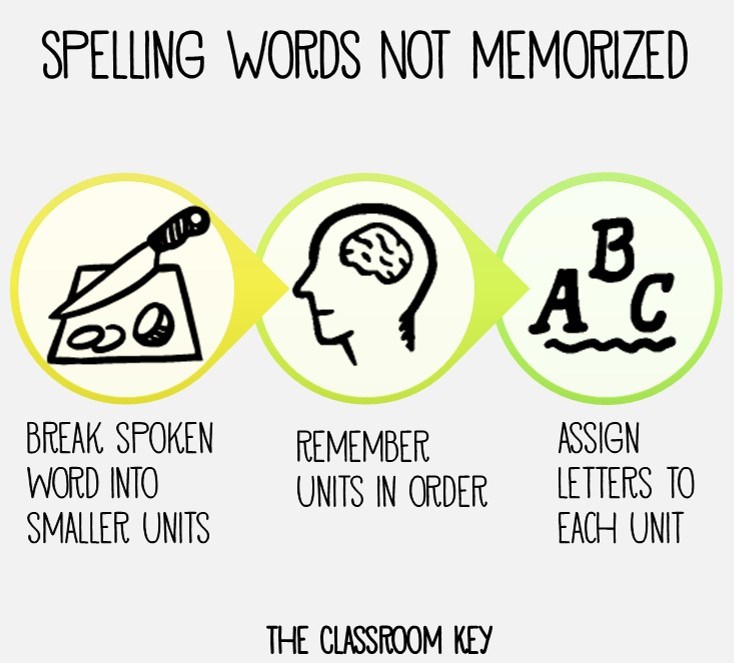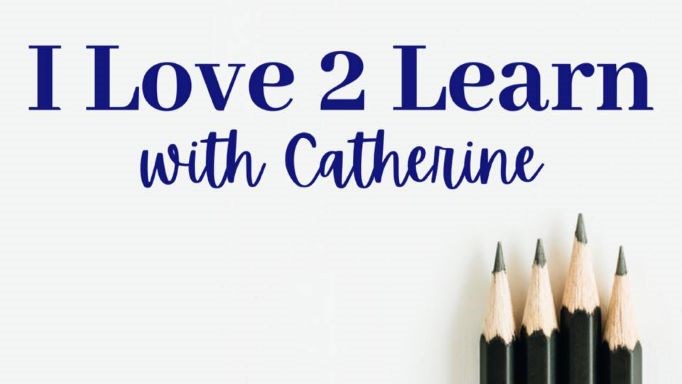Spelling Words NOT Memorized
Saturday, October 8, 2022 by Catherine Gilliland | Spelling

For students in the Phonetic and Transitional stages of spelling development (see my blog post from Sept. 26, 2022), there are a variety of strategies to practice the spelling words on an assigned list. While writing the words is extremely important, embracing a variety of practice methods engages the student's interest and expands their personal experiences with the word. Doing so with an enthusiastic attitude even further strengthens skill development. Try a few of these approaches with your child.
♥ J. Richard Gentry PhD, author, researcher, and literacy expert, encourages teachers to use A Five-Step Science-Based Spelling Pretest (For All Grades). Following these five steps not only improves spelling but contributes to a student's ability to become a fluent reader. On the Monday pretest, take the student through these five steps with each word: Hear It, Say It, Write It, Read It (and Self-Correct), Use It.
♥ Ask the student to identify any spelling patterns in their words that will help them to remember the spellings. Is there one consonant or vowel which is replaced with another to form a new word? For example, in the word CATCH the C can be replaced with the letters B, L, H, and others, creating completely new words with the same spelling pattern. In the word RAT, the A can be replaced with an O and U, forming new words with the same beginning and ending consonants. As patterns are identified, reinforce the associated spelling rules with the child. Include the various spelling rules and generalizations being used in their practice.
♥ A variation on the above is to write a consistent pattern in the words in one color while using a different color for the other letters.
♥ Play with the recitation of spelling rules and generalization with your child. Take turns reading or reciting the words or phrases of the rules. Play "20 Questions" or "I'm Thinking Of…" to guess which rule or generalization is being held in the mind. Playing games like this is great for highlighting the nuances contained in similar generalizations. Create and play a form of Pictionary with spelling rules and generalizations that need to be learned or reviewed.
♥ Ask the student to spell their spelling words orally, with letter tiles, pretzels, marshmallows and toothpicks, letters cut from a magazine, or other "tools" to stimulate their kinesthetic learning. If you use tiles, consider creating mini crosswords (as in the games Scrabble or Bananagrams).
♥ Use the computer keyboard to spell words over and over. Not only does the child reinforce spelling patterns, but they are also building muscle memory for the keyboard.
♥ Draw with sidewalk chalk the letters contained in the spelling words. Give the child a word to spell and let them hop from letter to letter to "spell" their word. Alternately, write one the letters on sheets of paper and spread them on the floor. Alternately, allow students to form the letters with their bodies as they say the letter names. Both methods slow down the spelling process and strengthen working memory, visual memory, gets the blood flowing to their brain through movement, and helps release some wiggles.
♥ Allow the child to use a whiteboard to spell their words. The slippery contact between the pen and board often makes the formation of letters easier for students. Added benefits include how easily mistakes can be wiped away and that exciting colors can be used.
♥ Sometimes words are simply "spelling demons". Using mnemonics to remember spellings is a great strategy for scaffolding students struggling with these words. For example, a PRINCIPAL is my PAL at school, while a PRINCIPLE is not. Even an anecdote for spelling a word as an acrostic can be helpful. For example, GEOGRAPHY can be remembered using George Edwards Old Grandpa Roasted A Pig Yesterday. Let the child create his own story to remind him of a tough word's correct spelling.
♥ Expose your child to their spelling words more than simply during spelling practice. "Hide" them around the house and let the child "seek" for them. Leave the list in a prominent location. Identify the words in books read aloud to your student.
♥ Play Hangman with current words. Include review spelling words to spice the game up a bit and include valuable review!
♥ Have fun practicing with your child in these fun and creative ways. Encourage, laugh, and celebrate. Embrace an attitude of delight in spelling. Model it for your student. Who knows, maybe they will learn to like spelling and you will strengthen your own spelling skills in the process.


